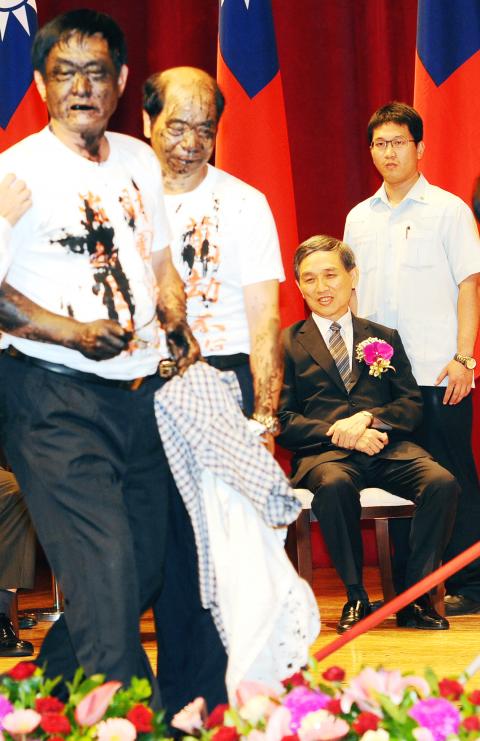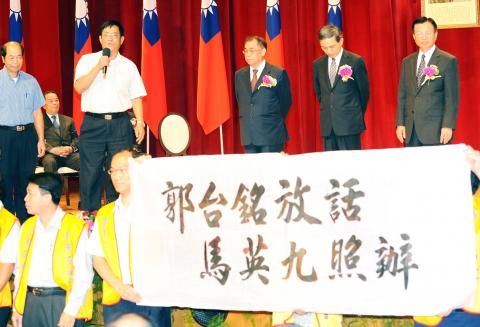Former deputy minister of economic affairs Lin Sheng-chung (林聖忠) yesterday took over as chairman of state-run oil refiner CPC Corp, Taiwan (CPC, 中油), with a brief protest disrupting the handover ceremony as workers railed against a government plan to privatize the company in 2014.
A group of CPC labor union members took to the stage before the ceremony officially started, pouring ink, unfurling banners and chanting slogans against the privatization plan. They were dragged off the stage by several company officials.
Faced with the opposition, Lin said that privatization would take time. He promised to listen to different voices and strive to reach a consensus through internal communication.

Photo: Chang Chia-ming, Taipei Times
Minister of Economic Affairs Shih Yen-shiang (施顏祥) said earlier that the ministry would submit the privatization plan to the Executive Yuan and Legislative Yuan for approval before the end of 2014.
TIMEFRAME
Asked about the timeframe, Shih said that within three years or four years after the privatization plan is approved by the legislature, CPC would release 51 percent of its shares and the government would keep the remaining 49 percent.

Photo: Chang Chia-ming, Taipei Times
Lin is taking over at a difficult time, with the public demanding that the state-run refiner, along with state-run electricity provider Taiwan Power Co (Taipower, 台電), improve its management efficiency and cut losses. Former Deputy Minister of Economic Affairs Hwang Jung-chiou (黃重球) was appointed Taipower chairman in May.
The two companies have come under fire since early this year, when they announced price increases to cover their operating losses. Fuel prices were raised in April, while electricity rates followed last month.
OIL EXPLORATION
Lin said CPC has oil exploration operations in seven countries and 21 mining areas and he would expand this business during his tenure to boost the company’s income.
He added that he would follow the measures recommended by a ministry-led task force to improve company operations and reach its goal of earning NT$44.2 billion (US$149.7 million) and saving NT$16.8 billion in costs for CPC in the next five years.

Taiwan Semiconductor Manufacturing Co (TSMC, 台積電) yesterday said that its investment plan in Arizona is going according to schedule, following a local media report claiming that the company is planning to break ground on its third wafer fab in the US in June. In a statement, TSMC said it does not comment on market speculation, but that its investments in Arizona are proceeding well. TSMC is investing more than US$65 billion in Arizona to build three advanced wafer fabs. The first one has started production using the 4-nanometer (nm) process, while the second one would start mass production using the

A TAIWAN DEAL: TSMC is in early talks to fully operate Intel’s US semiconductor factories in a deal first raised by Trump officials, but Intel’s interest is uncertain Broadcom Inc has had informal talks with its advisers about making a bid for Intel Corp’s chip-design and marketing business, the Wall Street Journal reported, citing people familiar with the matter. Nothing has been submitted to Intel and Broadcom could decide not to pursue a deal, according to the Journal. Bloomberg News earlier reported that Taiwan Semiconductor Manufacturing Co (TSMC, 台積電) is in early talks for a controlling stake in Intel’s factories at the request of officials at US President Donald Trump’s administration, as the president looks to boost US manufacturing and maintain the country’s leadership in critical technologies. Trump officials raised the

‘SILVER LINING’: Although the news caused TSMC to fall on the local market, an analyst said that as tariffs are not set to go into effect until April, there is still time for negotiations US President Donald Trump on Tuesday said that he would likely impose tariffs on semiconductor, automobile and pharmaceutical imports of about 25 percent, with an announcement coming as soon as April 2 in a move that would represent a dramatic widening of the US leader’s trade war. “I probably will tell you that on April 2, but it’ll be in the neighborhood of 25 percent,” Trump told reporters at his Mar-a-Lago club when asked about his plan for auto tariffs. Asked about similar levies on pharmaceutical drugs and semiconductors, the president said that “it’ll be 25 percent and higher, and it’ll

CHIP BOOM: Revenue for the semiconductor industry is set to reach US$1 trillion by 2032, opening up opportunities for the chip pacakging and testing company, it said ASE Technology Holding Co (日月光投控), the world’s largest provider of outsourced semiconductor assembly and test (OSAT) services, yesterday launched a new advanced manufacturing facility in Penang, Malaysia, aiming to meet growing demand for emerging technologies such as generative artificial intelligence (AI) applications. The US$300 million facility is a critical step in expanding ASE’s global footprint, offering an alternative for customers from the US, Europe, Japan, South Korea and China to assemble and test chips outside of Taiwan amid efforts to diversify supply chains. The plant, the company’s fifth in Malaysia, is part of a strategic expansion plan that would more than triple